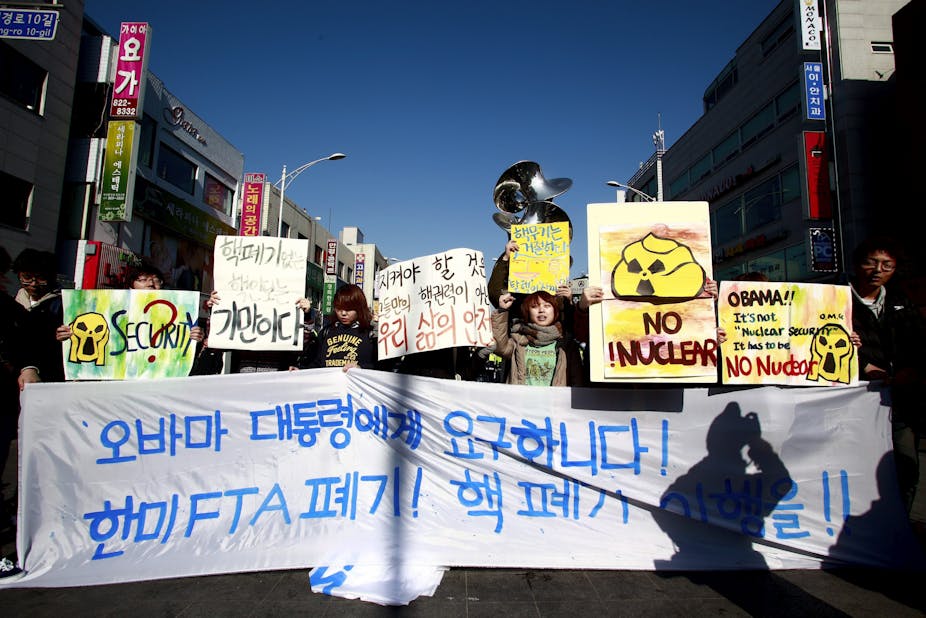It could all be a fanciful face lift, a matter of pure appearance.
Behind the pretty face of a regulated nuclear world, the somewhat more lethal effects of meltdown and its associated dangers are concealed.
The venue is Seoul, and the occasion is the Nuclear Security Summit that builds on the achievements since the Washington Summit of April 2010. Officials from 53 countries are in attendance to discuss ways to control and remove fissile material, ostensibly to prevent nuclear terrorism.
There has been much optimistic fanfare, with President Barack Obama touting the achievements of the Ukraine as a model. On the eve of the summit, the American president announced, “Ukraine has completed the removal of highly enriched uranium from its territory”. This adds to the efforts of such states as Chile, whose government announced a similar achievement a few years ago.
Elephants in the room
With all that said, the stories of nuclear security read like promises of apocalypse.
They either involve errant regimes with loose fingers on nuclear triggers or non-state agents happy to traffic in fissile material and the creation of “dirty bombs”. On the point of the former, North Korea, while its antics are not officially on the agenda, is the rather capacious elephant in the room. Iran is the somewhat smaller beast that is also competing for attention. Neither is in attendance.
The broader picture is one of inconsistent controls on the movement of nuclear fissile material and the proliferation of nuclear technologies that can fall into the hands of non-state parties often more in a commercial sense than ideological one. Much of this material is classed as “missing”, the result of maladministration and theft.
Graham Allison, director of Harvard University’s international security program, grimly stated , “If material is loose, it may already be impossible to contain or account for it. There are no precise figures on how much high-enriched uranium or plutonium is missing.”
Security think-tanks pour money into reports that yield the most calamitous scenarios. In 2006, RAND corporation released a report claiming 60,000 people could perish in the event of a terrorist nuclear attack on the US port of San Jose, California. The economic bill would be colossal – $1 trillion damage or thereabouts, including the cleanup costs.
The dirty bomb nightmare is, however, only part of the problem. States with nuclear power are themselves potentially threatened by the spectre of failure and insecurity.
Fukushima
The legacy of the Fukushima meltdown risks being minimised over the course of the summit.
Countries such as Pakistan are far from interested, at least officially, as to what happened at the Japanese plant. Instead, Prime Minister Syed Yusuf Raza Gilani has insisted on his country’s right to have such energy, and its successful safety record on that score, saying “Civil nuclear technology has been our requirement and we have been demanding it.” Pakistan’s record as an illicit proliferating force of nuclear technology makes this a problematic prospect.
The nuclear industry, even in the most advanced states, is far from spick and span. Private interests, some of them criminal, feature.
Last year, it was revealed that the Tokyo Electric Power Company (TEPCO), a corporation controlling both the power supply to Greater Tokyo and the Fukushima Daichii nuclear plant that suffered the triple meltdown in March, had “long-standing ties to anti social forces, including the yakuza”.
With such works as Yakuza and the Nuclear Industry, a tour de force of investigative reporting by Tomohiko Suzuki on the Fukushima cover-ups, we get a sense that nuclear industries are highly susceptible to corruption and malfeasance, even in the most sophisticated states.
An unsafe industry
Activists and environmental groups have further proven in several cases how poor global nuclear security is, be it in terms of weapons facilities or power plants.
In November 2010, NATO guards were bypassed by Belgian activists at a base in Kleine Brogel during which they took an ample number of pictures of the assortment of nuclear warheads on site.
Greenpeace has also demonstrated the security weaknesses in such countries as France, one of the developed world’s great promoters of nuclear energy, penetrating the facilities of the Electricite de France SA on 5 December and hiding in wait for 14 hours in one of the reactors.
Given the vast pitfalls of nuclear energy, its very premise as a safe source needs challenging. But given that states are intent on securing their share of the energy pie, controls will have to be of an inordinately stringent type.
Where there is a will, there is an atom. Given the track record of even the most technologically advanced states, scepticism about the summit in Seoul is entirely justified.

